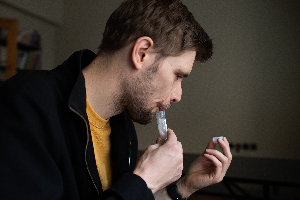Share this
When is dried saliva sampling useful?
by Neoteryx Microsampling on Aug 2, 2021 9:00:00 AM
 Researchers use biospecimens like urine, blood, stool, and saliva to study many diseases and compounds. Saliva samples are an especially great source of biological data about drugs and disease biomarkers. Saliva is universally considered an easy bio-fluid to collect using non-invasive, painless methods.
Researchers use biospecimens like urine, blood, stool, and saliva to study many diseases and compounds. Saliva samples are an especially great source of biological data about drugs and disease biomarkers. Saliva is universally considered an easy bio-fluid to collect using non-invasive, painless methods.
However, storing and transporting wet saliva can be expensive and problematic. Additionally, the biomarkers of disease are subject to degradation during storage and delivery.
Dried Saliva for Greater Sample Stability?
Dried saliva samples (DSS) are easier to transport and store, and can furnish researchers with the same rich data. They also provide better sample stability. Sample stability in long-term storage is vital because researchers may want to use the stored samples for related studies in the future. Dried saliva samples are also more cost-effective to store and more convenient to use in research studies.
Storage of Dried Saliva Samples
Scientists have conducted various studies on different ways to store dry saliva samples. A research group from Germany dried human saliva samples on filter paper using sucrose as a lyoprotective agent under ambient conditions. They then stored the samples under varying humidity and temperature conditions. They assessed the different cell types and their DNA contents and evaluated the effects of storage using Fourier transform infrared spectroscopy (FTIR).
The results showed saliva dried without sucrose has a higher content of some protein structures than samples dried with sucrose. This means dried saliva on filters containing sucrose has a high stability rate during storage. Dried saliva samples also eliminate the need for liquid nitrogen tanks or freezers for storage; they can be stored in non-laboratory settings, making this approach ideal for studies in low-resource regions.
Benefits of Saliva Sampling
Saliva sampling can serve as an excellent alternative to blood sampling. Saliva-producing glands are highly porous, which means they allow for free exchange between blood and the cells. However, saliva has lower immunoglobulin and DNA amounts compared to blood.
Dry saliva sampling is non-invasive compared to blood sample collection. Saliva doesn’t clot and is also safe for handling, with a lower transmission risk than other bio-fluid samples.
Additionally, saliva can be used to analyze many diseases, including cancers. Saliva samples can detect protein markers for the diagnosis of systemic cancers, for example. It can also be used for pregnancy testing and detection of drugs and alcohol. Another application is the detection of viral and bacterial infections.
Mitra Devices for DSS (Dried Saliva Sampling)
Mitra® devices from Neoteryx make it possible for study subjects to collect saliva samples remotely. The devices are small, portable, and have a patented VAMS® tip, which is made from a unique material designed to absorb a fixed volume of bio-fluid sample. The collection process is easy and convenient, and so is transportation to the lab for analysis.

Image Credits: Trajan, iStock
Share this
- Microsampling (206)
- Research, Remote Research (119)
- Venipuncture Alternative (105)
- Clinical Trials, Clinical Research (83)
- Mitra® Device (73)
- Therapeutic Drug Monitoring, TDM (51)
- Dried Blood Spot, DBS (39)
- Biomonitoring, Health, Wellness (30)
- Infectious Disease, Vaccines, COVID-19 (24)
- Blood Microsampling, Serology (23)
- Omics, Multi-Omics (21)
- Decentralized Clinical Trial (DCT) (20)
- Specimen Collection (18)
- Toxicology, Doping, Drug/Alcohol Monitoring, PEth (17)
- Skin Microsampling, Microbiopsy (14)
- hemaPEN® Device (13)
- Preclinical Research, Animal Studies (12)
- Pharmaceuticals, Drug Development (9)
- Harpera Device (7)
- Industry News, Microsampling News (5)
- Antibodies, MAbs (3)
- Company Press Release, Product Press Release (3)
- Environmental Toxins, Exposures (1)
- July 2025 (1)
- May 2025 (1)
- April 2025 (2)
- December 2024 (2)
- November 2024 (1)
- October 2024 (3)
- September 2024 (1)
- June 2024 (1)
- May 2024 (1)
- April 2024 (4)
- March 2024 (1)
- February 2024 (2)
- January 2024 (4)
- December 2023 (3)
- November 2023 (3)
- October 2023 (3)
- September 2023 (3)
- July 2023 (3)
- June 2023 (2)
- April 2023 (2)
- March 2023 (2)
- February 2023 (2)
- January 2023 (3)
- December 2022 (2)
- November 2022 (3)
- October 2022 (4)
- September 2022 (3)
- August 2022 (5)
- July 2022 (2)
- June 2022 (2)
- May 2022 (4)
- April 2022 (3)
- March 2022 (3)
- February 2022 (4)
- January 2022 (5)
- December 2021 (3)
- November 2021 (5)
- October 2021 (3)
- September 2021 (3)
- August 2021 (4)
- July 2021 (4)
- June 2021 (4)
- May 2021 (4)
- April 2021 (3)
- March 2021 (5)
- February 2021 (4)
- January 2021 (4)
- December 2020 (3)
- November 2020 (5)
- October 2020 (4)
- September 2020 (3)
- August 2020 (3)
- July 2020 (6)
- June 2020 (4)
- May 2020 (4)
- April 2020 (3)
- March 2020 (6)
- February 2020 (3)
- January 2020 (4)
- December 2019 (5)
- November 2019 (4)
- October 2019 (2)
- September 2019 (4)
- August 2019 (4)
- July 2019 (3)
- June 2019 (7)
- May 2019 (6)
- April 2019 (5)
- March 2019 (6)
- February 2019 (5)
- January 2019 (8)
- December 2018 (3)
- November 2018 (4)
- October 2018 (7)
- September 2018 (6)
- August 2018 (5)
- July 2018 (8)
- June 2018 (6)
- May 2018 (5)
- April 2018 (6)
- March 2018 (4)
- February 2018 (6)
- January 2018 (4)
- December 2017 (2)
- November 2017 (3)
- October 2017 (2)
- September 2017 (4)
- August 2017 (2)
- July 2017 (4)
- June 2017 (5)
- May 2017 (6)
- April 2017 (6)
- March 2017 (5)
- February 2017 (4)
- January 2017 (1)
- July 2016 (3)
- May 2016 (1)
- April 2016 (2)


No Comments Yet
Let us know what you think